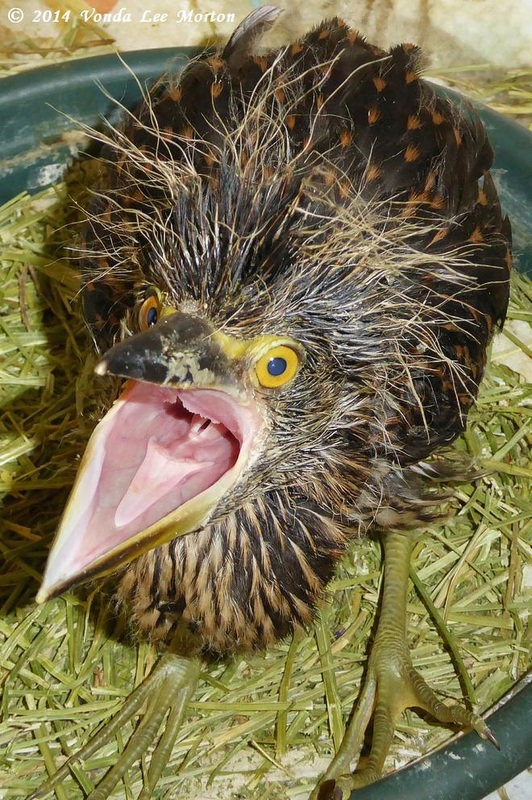But every now and then one little critter will slip past those barriers and win your heart. When he’s healthy and eventually releasable, it’s not a problem, because as much as you love him, he grows up to be exactly what nature intended: a beautiful, healthy young whatever-the-species. And you’re delighted to see him take his rightful place in the wild.
When that baby that’s slipped past those barriers and won your heart is unhealthy, though, and you struggle to keep him alive, consult other rehabbers and your vets to make sure the care you’re providing is, in fact, the best possible…and then you have to make the heartbreaking call to euthanize, it will rip your heart into shreds and twist your guts inside out.
I had to make that call today on a sweet little baby who hadn’t just slipped past those barriers of clinical distance; he’d plowed through them like they weren’t even there.
I had to euthanize the heron chick.
He’d been going downhill pretty much from day one; I was just too caught up in his cuteness to accept that. The only day he actually ate on his own was the day he arrived, starving after going 24 hours with no food. From that point onward, I had to sit him in my lap and hand feed him. He stood on those stilt-like legs only two or three times during the first few days; then he settled down in the nest and refused to stand again. He began to spit food out, and still I hand fed, pausing longer and longer between pieces of fish to give him time to struggle to swallow. He nearly doubled his body weight in just 10 days because of the hand feeding…and Tuesday evening, he crashed. He couldn’t keep anything solid down. He shrieked when I touched him. He sprawled with his wings outspread as if something was broken.
I was up all night checking on him every couple of hours; Wednesday morning after I had all the other birds fed, I tried him on songbird formula, figuring we had nothing to lose at this point. He was able to keep it down but was still struggling to swallow properly. I called waterfowl rehabber Grace Krick in Connecticut, who’d been my go-to when this little guy came in. We had discussed my proposed treatment plan and she agreed that it sounded like what she’d do. We’d talked again when he started having to be hand fed and she was worried about that but agreed that as long as he was eating, well, maybe he was just younger than we originally thought and would grow out of it.
This time, as Grace listened to my description of his crash and questioned me as to his pre-crash behavior and so forth, she sighed and told me that it sounded as if I’d been fighting a losing battle from the get-go. I knew she was right; we debated whether I should go ahead and euthanize or give him another day. I decided on another day.
Later that afternoon, I decided to take him to the vet, as well, for x-rays. Maybe his parents had fed him a fish with a lead sinker in its body or maybe he’d stumbled over the edge of his nest and managed to break a bone. I was grasping at straws, trying to find SOME fixable cause for his condition. Vet Peggy Hobby at Smalley’s Animal Hospital listened to the same details; watched portions of the videos that, looking at them in the cold, hard light of day, clearly showed his decline; watched his current behavior; and suggested that it was possibly neurological, which could be from lead poisoning. We did the x-rays. Nothing. No lead, all bones were perfect…Maybe parasites? Peggy agreed to run a fecal to be sure. No parasites.
Basically, we had a bird who was slowly losing musculoskeletal control and no reason we could find for it. Peggy said whatever it was , it was progressive and degenerative and admitted that he probably didn’t have long but said to try antibiotics, if I wanted, just because we had nothing to lose. She knew I wasn’t ready to euthanize just yet, so she didn’t even mention it. I started antibiotics and even extra calcium upon arriving home. (He’d been getting calcium and avian vitamins on his fish, per a rehab manual that had a section on herons, but hey—any port in a storm, right?)
Through all this he remained fairly alert but was so weak he couldn’t even hold his head up. By this afternoon, he was unable to right himself when he somehow flipped onto his back. It was time to call it.
I euthanized this sweet little heron who had won my heart, and then I slumped against the wall and bawled like I haven’t bawled over a rehab in years—gut-wrenching, loud sobs, followed by childlike snubbing—for about 15 minutes.
And then I wiped my face and mixed up more songbird formula, put out a mouse to thaw for the screech owl, and fed the baby possum, because even in the midst of death and grief, life goes on and other babies have to be fed.
That, my friends, is the harsh reality of a rehabber’s world.

 RSS Feed
RSS Feed
